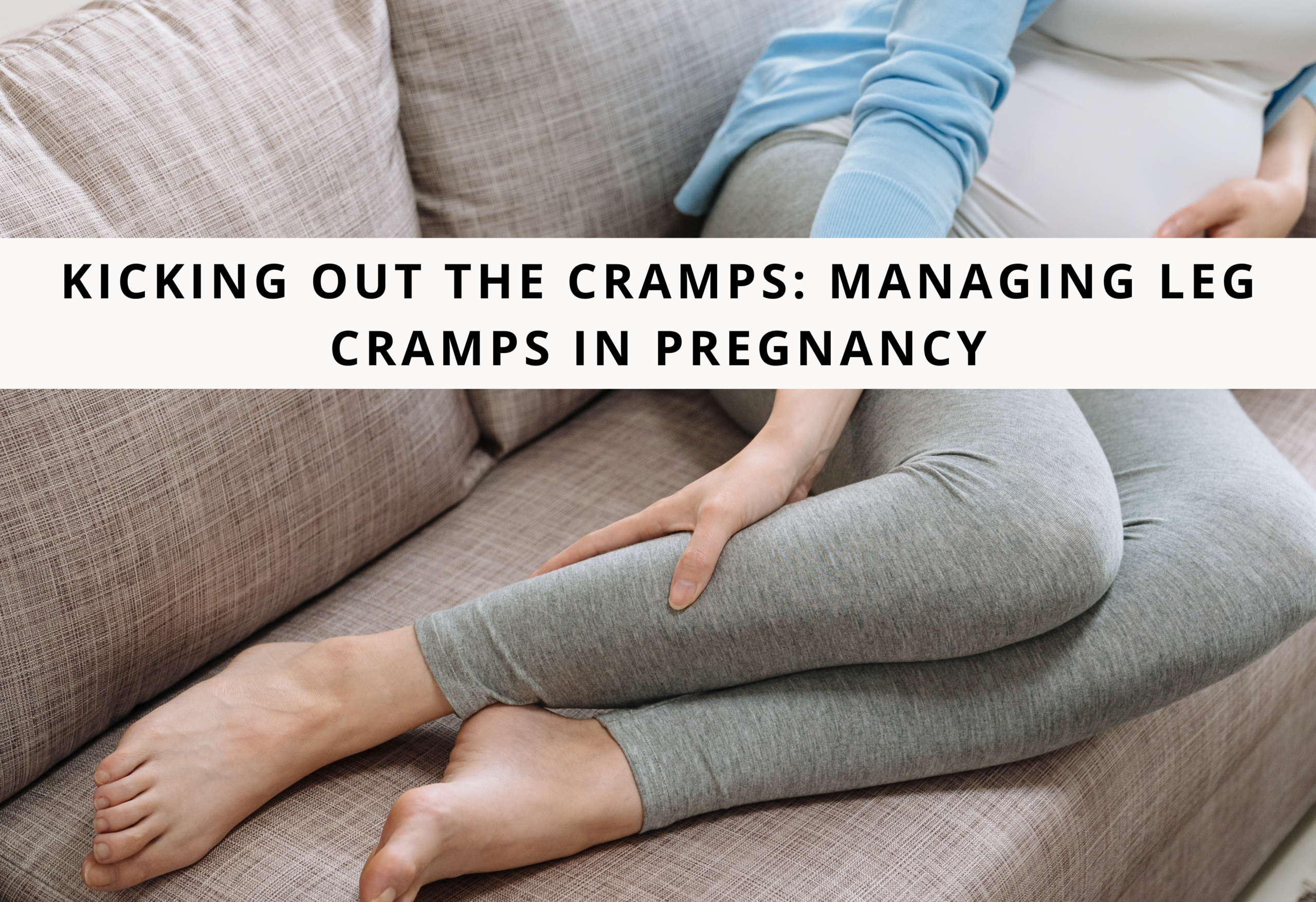Nighttime leg cramps can be an unwelcome companion during pregnancy, particularly in the second and third trimesters. Many expectant mothers are familiar with the sudden, sharp pain that can jolt them awake from a peaceful sleep. These cramps, often occurring in the calf or foot muscles after periods of inactivity, are both common and, fortunately, manageable.
Understanding Leg Cramps In Pregnancy
The precise cause of leg cramps during pregnancy remains a bit of a mystery. However, one theory suggests that they may be linked to the accumulation of lactic and pyruvic acids – byproducts of metabolizing dietary sugars and starches – exacerbated by impaired blood flow in the legs. Additionally, fluctuations in vitamin B and imbalances in the calcium-phosphorus-magnesium levels might contribute to these uncomfortable spasms.
How to Prevent and Alleviate Leg Cramps in Pregnancy
Self-Care And Relief Strategies
- Exercise Regularly: Engaging in light exercises like walking helps circulate metabolic by-products that cause cramps, keeping muscles stretched and flexible. It also helps you get better sleep, prevents constipation in pregnancy, and helps prevent and alleviate swelling in pregnancy.
- Stay Hydrated: Adequate fluid, electrolyte, and mineral intake is essential to avoid dehydration, a potential cramp trigger.
- Calf Stretches Before Bed: Gentle stretching of the calf muscles before sleep can reduce the frequency of cramps. One effective stretch involves extending the leg and gently flexing the foot towards your body.
- Mind Your Posture: Try to avoid sitting or standing in one position for too long. Regular movement can prevent cramps by promoting blood flow.
- Warm Baths: Soaking in warm water with epsom salts before bedtime can relax the leg muscles, offering relief from cramps and promoting a more restful sleep.
- Prenatal Yoga: Prenatal yoga can be an effective way to prevent and alleviate leg cramps during pregnancy through several mechanisms. Firstly, the gentle stretching involved in prenatal yoga helps improve circulation in the legs, reducing the buildup of metabolic by-products that can contribute to cramping. These stretches specifically target the muscles that are prone to cramping, such as the calves and feet, promoting flexibility and reducing tension. Secondly, prenatal yoga enhances overall muscle tone and strength, supporting the body’s ability to handle the physical changes of pregnancy more comfortably.
- Increase Daily Magnesium Citrate Supplementation: Magnesium citrate can help alleviate and prevent leg cramps during pregnancy through its role in muscle function and relaxation. Magnesium is a vital mineral that acts as a natural calcium blocker, helping muscle cells relax after contraction. When magnesium levels are low, muscles may contract too much, leading to cramps. Supplementing with magnesium citrate can ensure adequate magnesium levels, thereby reducing the frequency and severity of muscle cramps by promoting relaxation and preventing excessive muscle contractions.
Additionally, magnesium plays a critical role in maintaining proper electrolyte balance, which is essential for muscle health and function. By improving this balance, magnesium citrate can further help in preventing the conditions that lead to cramping. While current research is mixed on the efficacy of magnesium supplements for leg cramps in all individuals, many find relief from supplementation, suggesting it may be a beneficial preventive measure and treatment for some pregnant individuals experiencing leg cramps. However, it’s important to consult with a healthcare provider before starting any new supplement during pregnancy. Read more about all the awesome benefits of magnesium during pregnancy here.
Immediate Relief For Leg Cramps
When a leg cramp strikes, immediate action can help alleviate the pain:
- Stretch and Massage: Stand up and stretch the affected muscle gently. Dorsiflexing the foot (pulling the toes toward your shin) can also ease the cramp. Massaging the cramped muscle softly can help, too.
- Apply Heat: A warm towel or heating pad applied to the muscle can relax it and reduce pain.
When to Call the Midwife
Leg cramps, while typically a normal part of pregnancy, can sometimes indicate underlying issues. Contact your midwife if you experience:
- Persistent or Severe Cramps: Especially if they don’t improve with self-care measures.
- Associated Symptoms: Such as swelling, redness, or warmth in the leg, which could suggest blood flow problems.
- Nutritional Concerns: If you suspect dietary deficiencies might be contributing to your cramps, a consultation can help address these issues.
Leg cramps are a common yet manageable aspect of pregnancy. By adopting preventative strategies and knowing how to respond when cramps occur, you can reduce their impact and enjoy a more comfortable pregnancy journey. Remember, your midwife is there to support you through all the aches and pains of pregnancy, so don’t hesitate to reach out for advice or reassurance.
FAQs about Leg Cramps in Pregnancy
- Why do leg cramps occur more frequently during pregnancy?
Leg cramps are particularly common in the second and third trimesters of pregnancy due to several physiological changes. These include increased pressure from the growing uterus on the veins that return blood from your legs, changes in blood circulation, and fluctuations in calcium, magnesium, and other electrolyte levels. Additionally, the extra weight and changes in posture can strain the muscles in your legs, contributing to cramps. - Can leg cramps during pregnancy indicate a mineral deficiency?
Yes, leg cramps can sometimes indicate a deficiency in essential minerals such as magnesium, calcium, or potassium, which play key roles in muscle health and function. However, it’s essential to consult with a healthcare provider before taking any supplements, as they can assess whether a deficiency is causing your cramps and recommend appropriate supplementation if needed. - Are there any dietary changes that can help reduce the frequency of leg cramps in pregnancy?
Incorporating foods rich in magnesium, calcium, and potassium can help manage leg cramps. These include leafy green vegetables, nuts, seeds, bananas, dairy products, and whole grains. Staying well-hydrated by drinking plenty of water is also crucial, as dehydration can contribute to muscle cramps. - Is it normal for leg cramps to occur more often at night?
Yes, leg cramps commonly occur at night during pregnancy, often waking individuals from sleep. This may be due to decreased movement, which can impair circulation to the legs, and the natural relaxation of muscles during sleep, making them more susceptible to cramping. - Can regular physical activity during pregnancy help prevent leg cramps?
Regular, moderate physical activity, such as walking or prenatal yoga, can improve circulation and reduce the risk of leg cramps. Exercise helps stretch and strengthen the muscles, which may prevent the cramps from occurring. Always consult with your healthcare provider before starting or modifying your exercise routine during pregnancy to ensure it’s safe for you and your baby.
Additional Resources about Leg Cramps in Pregnancy
- Interventions for leg cramps in pregnancy from the Cochrane Database
- Leg Cramps from the UK National Health Institute
- Leg Cramps from The Cleveland Clinic




